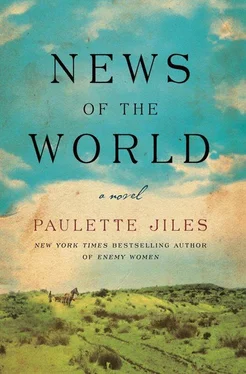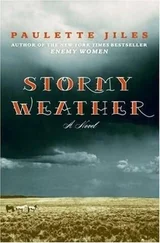You’re the man that reads the news.
Yes, I am.
Well how come we ain’t in the news?
I don’t know, the Captain said. I don’t write the newspapers.
I’m Merritt Horrell and this is Tom and he’s my brother, and these are my other brothers here. Mart and Benjamin and Sam.
The five brothers wore various articles of dress that had been pieced together out of military uniforms from both sides, missing buttons and faded to an unvarying slate color. One had two different kinds of stirrups, one metal, one wood, and none of their hats seemed to fit. The youngest, or at least the smallest, no more than fourteen by the look of him, wore a derby far too big for his head and the Captain realized the boy had stuffed the inside band with rags or paper to make it fit. It seemed suspended over his small head. Whatever woman had raised these five boys must now be in the county asylum, if Lampasas County had one, and if they did not, they had best build one soon.
Enchanted, gentlemen, he said. Maybe you are in the news. You could well be in the news back in the east. Say, Chicago or the little one-sheet paper in Ball Ground, Georgia. Just think. The Captain shook out his newspapers. Perhaps London or even California.
Well, we should be, said Merritt. He had a dull stare that was also strangely intent. We killed a right smart of Mexicans. You’d think they’d put in something.
He took off his hat and slapped the edge of his hand into the crown to straighten the crease. He looked as if he had combed his stiff yellow hair with a skillet.
Kidd nodded and said, And nobody objects to your killing a right smart of Mexicans?
Ain’t nobody. Merritt replaced his hat and then crossed his hands on the saddle horn. Governor Davis chucked out everbody that was with the Confederacy and never replaced them. Some Army people come around sometimes. I guess they would object probably.
Could be. The Captain reached for a roll of rope and turned and strung it between two trees and began to throw the blankets over it to air them.
Would they be doing a wood engraving of us?
I have no idea.
He looked up and saw Johanna on the far side of the spring, watching from the Carrizo cane. This surprised him. She could move so silently when she wanted. She was an apparition of flying hair and bare feet in the deepening shadows. The cane plumes rose and fell with the chilly breeze, all around and above her head.
Well, said Merritt. Come to the saloon in town, it’s called The Gem, the other one is The Great Western, but come to The Gem and read your news. Telling how we pursued the hated Red Man and everthing, how the Higgins brothers cruelly murdered, et cetera. Despite Davis’s pitiless state police and like that.
I hope you won’t mind if I am late.
No sir, not at all. You come anytime. If people don’t want to hear you read about us, well then, we would not object to them leaving.
And so he did not go, but sat up and waited and before nine o’clock by his hunting watch he could tell from the noise in town the Horrells were probably drunk. He could hear them all the way from the springs; sounds of music and shouts, far away and thin. He watched the night world and heard its sounds. He smelled tobacco smoke. He watched Pasha; the horse lifted his head from his grazing and stared across the spring at what Kidd guessed were other horses but did not call out. The Captain saw the glow of a cigarette. The Merritt brothers were there and guarding him and Johanna as they said they would. They would take turns, watch on watch. He did not sleep at all that night but sat leaning against a wheel with his revolver in hand and they left before it was daylight.
THEY CAME SOUTH into the hill country at last. And here everything was still.
He rode Pasha and put a sort of blanket saddle pad on the packhorse under the harness and the butcher knife in his waistband as well as his revolver. If the raiders came he would cut the packhorse out of the harness and throw Johanna on the saddle pad and they would run for it and abandon the wagon. Perhaps looting the wagon would slow them down.
The Comanches mostly came from the north, down from the Red River, across the open arid country around Lampasas. The dust they raised could be seen for miles and so they skirted the towns and forts. When they came on south to the hill country there was concealment and water and isolated farms. They loved the hill country with a raider’s passion. Here was fighting and here was loot with no soldiers to stop them.
The world fell away from beneath the wheels of the Curative Waters wagon, valley after valley, ridge after ridge falling away to the blue horizon.
As they came to the top of a rise he kept carefully to one side of the road so they could not be skylighted and stopped. He would sit for fifteen, twenty minutes at a time looking and listening for signs of life, for raiding parties. He listened for the quarreling bark of a squirrel, disturbed by riders. He watched the buzzards circling overhead, looking for both the tight spiral that meant a dead body somewhere, a carcass either human or animal, and also for their sudden dips, for they were curious birds and would drop like stones on those remarkable wings to inspect something new or unusual.
Johanna watched as well. She did not play with her cat’s cradles or make up sentences in English. She wore the confining shoes and laid the shotgun longways at her feet. He did not smoke his pipe. The distinctive odor carried for long distances. And also he took in the air for the scent of others’ tobacco smoke. Nothing. The wind had dropped. From the rises he inspected the tops of the trees below, both before and behind the rise, the live oak and the bur oak, the occasional hickories in ravines, for movement that was not made by the wind. Nothing. So they went on.
He kept the packhorse’s lead in his hand. They started in the early morning when the stars told their way from east to west. They passed abandoned farms, little cabins with stone fencing here and there. Some had been burned down.
They came through the red granite country north of Llano. Mountains of red and pink granite. The valleys were starred with Mexican hat and gayfeather waving in tall magenta rods, bluebonnets by the acre. It was flowering time in the hill country. New grass for their horses, tender growth for the whitetail deer, and at night a ringtail cat with it sixteen-stripe tail and bat ears and eyes big as buckeyes carefully raised a kernel of corn from the horse’s spillage, lifted the kernel to its cat mouth while they silently watched. It sat curious and fearless at the farthest edge of the firelight while Johanna whispered to it in Kiowa, inflections of delight.
They came to a destroyed cabin and he pulled up and then went inside. Broken cups and pieces of dress material torn on a nail. A doll’s body without a head. He dug a .50-caliber bullet out of the wall with his knife and then carefully placed it on the windowsill as if for a memento. Here were memories, loves, deep heartstring notes like the place where he had been raised in Georgia. Here had been people whose dearest memories were the sound of a dipper dropped in the water bucket after taking a drink and the click of it as it hit bottom. The quiet of evening. The shade of the Devil’s trumpet vine over a window, scattered shadows gently hypnotic. The smell of a new calf, a long bar of sun falling into the back door over worn planks and every knot outlined. The familiar path to the barn walked for years by one’s father, grandfather, uncles, the way they called out, Horses, horses. How they swung the bucket by the handle as they went at an easy walk down the path between the trees, between here and there, between babyhood and adulthood, between innocence and death, that worn path and the lifting of the heart as the horses called out to you, how you knew each by the sound of its voice in the long cool evening after a day of hard work. Your heart melted sweetly, it slowed, lost its edges. Horses, horses. All gone in the burning.
Читать дальше












